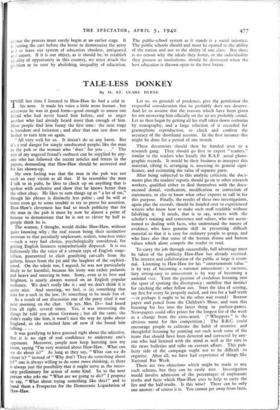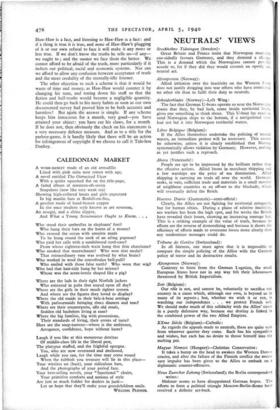TALE-LESS DONKEY
By M. ST. CLARE BYRNE
THE last time I listened to Haw-Haw he had a cold in his nose. It made his voice a little more human . but otherwise he was in good form—good enough to amuse one friend who had never heard him before, and to anger another who had already heard more than enough of him. Most people find him funny the first time: the next stage is boredom and irritation ; and after that one just does not bother to turn him on again.
" All very well for us. It doesn't do us any harm. But it's a real danger for simple uneducated people, like the man in the pub or the woman who ' does ' for you . . ." The rest of my angered friend's outburst can be supplied by any- one who has followed the recent articles and letters in the papers, demanding that Haw-Haw should be answered and his lies shown-up.
My own feeling was that the man in the pub was not such an easy victim as all that. If he resembles the men I talk to in pubs, he likes to check up on anything that is spoken with authority and show that he knows better than the other chap. He likes to sum things up as " a lot of rot," though his phrase is distinctly less polite ; and he will at times even go to some trouble to try to prove his assertion. Haw-Haw's cleverness has had so much publicity that for the man in the pub it must by now be almost a point of honour to demonstrate that he is not so clever by half as people think he is.
The women, I thought, would dislike Haw-Haw, without quite knowing why ; the real reason being their instinctive aversion to that peculiarly unpleasant, sexless, tone-less voice —such a very bad choice, psychologically considered, for getting English listeners sympathetically disposed. It is too ludicrously like the voice of a certain type of English stage- villain, guaranteed to elicit gratifying cat-calls from the gallery, hisses from the pit and the laughter of the sophisti- cated. On the whole too, I argued, he was not particularly likely to be harmful, because his irony was rather pedantic and heavy and sneering in tone. Irony, even at its best and brightest, is nearly always wasted on an English popular audience. We don't really like it ; and we don't think it is quite nice. And sneering, we feel, is (a) something that asks for a sock in the jaw, (b) something to be made fun of.
As a result of our discussion one of the party tried it out next morning on the char. Oh yes, Mrs. D— had heard him all right, several times. Yes, it was interesting the things he told you about Germany ; but all the same, she didn't really like him, it wasn't nice the way he spoke about England, so she switched him off now if she found him talking. . . .
It was gratifying to have guessed right about the adjective. But it is no sign of real confidence to underrate one's opponent. Moreover, people now keep bursting into my room, saying "I'm very worried about Haw-Haw. What can we do about it?" As long as they say, " What can we do about it? " instead of " Why don't They do something about it?" one is always willing to do some more thinking, as there is always just the possibility that it might serve as the neces- sary preliminary for action of some kind. So to the next person who asks me " What are we going to do?" I propose to say, " What about trying something like this?" and to hand them a Prospectus for the Democratic Liquidation of Haw-Haw. Let us, on grounds of prudence, give the gentleman the respectful consideration that he probably does not deserve. And let us assume that the reasons which have been given for not answering him officially on the air are probably sound. Let us then begin by getting all his stuff taken down verbatim by stenography, and a large selection of it recorded for gramophone reproduction, to check and confirm the accuracy of the shorthand account. In the first instance this might be done for a period of one month.
These documents should then be handed over to a research gang. They should go first to expert " readers," similar to the readers who handle the R.A.F. aerial photo- graphic records. It would be their business to interpret this material, sifting it, arranging it, assessing its general signi- ficance, and estimating the value of separate parts.
After being subjected to this analytic criticism, the docu- ments plus the readers' reports should go on to other research workers, qualified either to deal themselves with the docu- mented denial, verification, modification or correction of statements, or else to know what other experts to call in for this purpose. Finally, the results of these two investigations, again plus the records, should be handed over to experienced writers who know how to make such stuff readable without falsifying it. It needs, that is to say, writers with the scholar's training and conscience and values, who are accus- tomed to dealing with facts, who understand the nature of evidence, who have genuine skill in presenting difficult material so that it is easy for ordinary people to grasp, and who have also that sense of the human drama and human values which alone compels the reader to read.
To carry the job through successfully, full advantage must be taken of the publicity Haw-Haw has already received. The interest and collaboration of the public at large is essen- tial. Listening to Haw-Haw for his " entertainment value " is by way of becoming a national amusement: a vacuous, lazy sitting-easy to amusement is by way of becoming a national vice. Turn the pastime of credulous listening into the sport of spotting the discrepancy: mobilise that instinct for catching the other fellow out. Start the idea of scoring, say five for every lie properly nailed, and two for a half-truth —or perhaps it ought to be the other way round? Borrow paper and pencil from the Children's Hour, and turn this listening for lies into the latest thing in parlour-games. Newspapers could offer prizes for the longest list of the week as a change from the cross-word. (" Whoppers " is the obvious name for this competition.) The B.B.C. could encourage people to cultivate the habit of attentive and thoughtful listening by pointing out each week some of the items that should have been detected and corrected by any- one who had listened with the mind as well as the ears to the news bulletins and talks on current affairs. This pub- licity side of the campaign ought not to be difficult to organise. After all, we have had experience of things like National Rat Week.
There are two objections which might be made to any such scheme, but they can be easily met. Investigation would involve admission of the percentages of unpleasant truths and facts which Haw-Haw uses to help to carry the lies and the half-truths. Is this wise? There can be only one answer: of course it is. You cannot get away from facts. Haw-Haw is a fact, and listening to Haw-Haw is a fact: and if a thing is true it is true, and none of Haw-Haw's plugging of it or our own refusal to face it will make it any more or less true. If we don't know the truths he tells us—if any— we ought to ; and the sooner we face them the better. We cannot afford to be afraid of the truth, more particularly if it indicts our political, social and economic systems. Nor can we afford to allow any confusion between acceptance of truth and the mere credulity of the mentally-idle listener.
The other objection to such a scheme is that it would be waste of time and money, as Haw-Haw would counter it by changing his tune, and toning down his stuff so that the fiction and half-truths would become a negligible quantity. He could then go back to his nasty habits as soon as our own documented survey had proved him to be both accurate and harmless! But again the answer is simple. If any scheme keeps him innocuous for a month, very good—you have attained your object: you have cut his claws, for a month. If he does not, then obviously the check on his statements is a very necessary defence measure. And as to a title for the parlour-game, it is hardly likely that there will be an action for infringement of copyright if we choose to call it Tale-less Donkey.















































 Previous page
Previous page